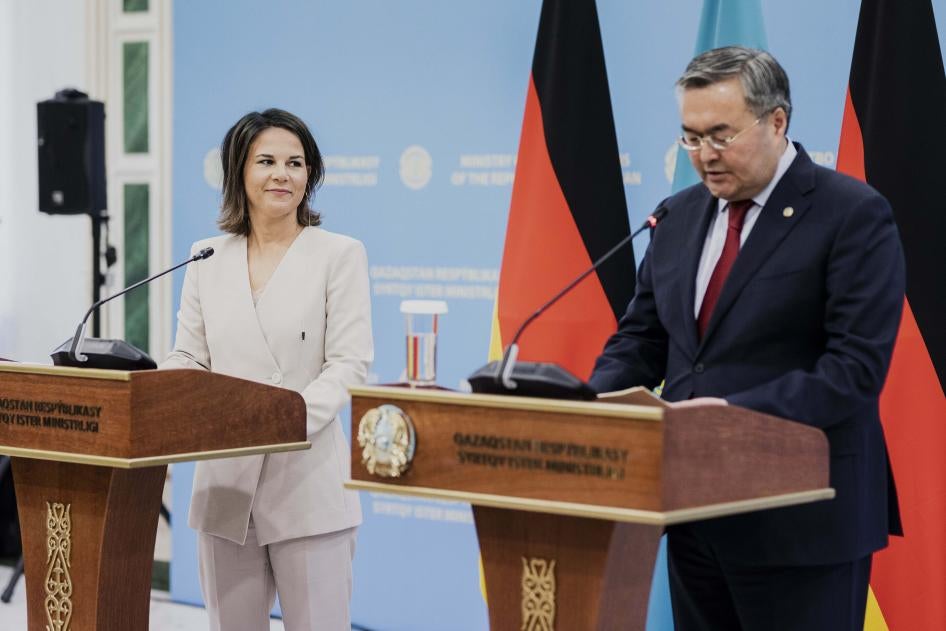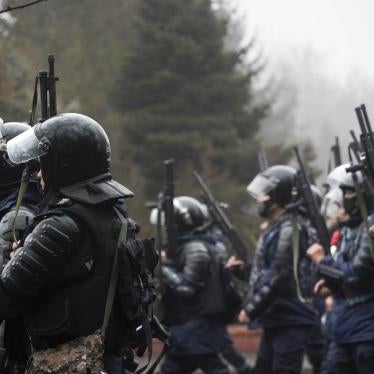Central Asia has gained more prominence in German foreign policy since the start of Russia’s war in Ukraine. Russia’s influence over these five former Soviet republics has been brought into sharp relief since February 24. Pressure from Russia to fall in line with Moscow’s war has been intense. And the knock-on effects have been huge, most recently the tens of thousands of Russians fleeing conscription by crossing into Kazakhstan.
Annalena Baerbock’s trip to Kazakhstan and Uzbekistan in late October sent the message that these countries have Germany’s support in standing up to Russia, and to China, as the latter also seeks to increase its influence in the region. The German foreign minister told leaders in both countries that they did not need to be “straitjacketed” by Russia. In contrast, she said, Germany, and Europe more widely, offered the region a “fair partnership.” Her visit came only days after EU Council President Charles Michel also visited both countries.
Baerbock returned to Germany with pledges for closer co-operation. Both countries have a strong interest in fostering relations with Europe, as a counterbalance to Russia and China, and as a market for their plentiful energy and raw material exports.
Yet despite such apparent harmony, hard work for Germany lies ahead. Its efforts to wean the region away from Russia – and to secure much-needed energy sources for German consumers – cannot mean turning a blind eye to serious human rights and rule of law violations. This is in a region dominated by highly authoritarian governments that barely tolerate dissent or free media, and with little, if any, political pluralism, and no free elections. On November 20, President Tokayev was re-elected with 81 percent of the vote for a new 7-year term in an election that “lacked competitiveness,” according to international observers.
Baerbock made an important start on these issues. Promoting a human rights-oriented foreign policy was an important element of her visit. In Kazakhstan she met women activists to discuss human rights abuses during and after protests in January that left over 230 people dead on the streets of Almaty, the business capital, and elsewhere.
In Uzbekistan, through visits to a textile factory and a copper mine, she urged the authorities to improve working conditions and promote fair supply chains in a country infamous for decades of forced labor in its cotton fields. And her conversations in a women’s shelter with survivors of domestic violence helped shine a light on a crisis across the whole region.
She said Germany was keen on closer business ties, but that these work best based on strong rule of law protections, when companies have predictable business conditions and citizens have basic human rights.
Both countries pose a clear test for Germany on whether these important messages will lead to real changes in their human rights record. As events this year show, both governments are skilled at public relations and resisting pressure for change on human rights.
In Kazakhstan, despite immediate calls from the United Nations and the European Union – repeated last week by Baerbock – the government has refused to open an independent inquiry into how so many people died in the protests in January. As a result, there is little prospect of accountability for the lives lost, as the authorities refuse to effectively investigate wrongdoing in their own ranks. Tolerating such a stance needs to be off limits for Germany if it sees Kazakhstan as a genuine long-term partner.
In Uzbekistan, street protests in the autonomous region of Karakalpakstan in July left at least 21 people dead and hundreds injured, many with horrific wounds caused by the unjustified use of weapons such as grenades in the midst of protests. As in Kazakhstan there is no sign the government wants to bring to justice security forces who may be responsible for these deaths and injuries.
The Uzbek foreign minister assured Baerbock that Uzbekistan remains committed to reform programmes on human rights and other issues that began after a new president took power in 2016. In reality these human rights reforms have stalled or gone into reverse, as the detention of a dozen bloggers in the last two years highlights.
Germany’s renewed support for Uzbekistan and Kazakhstan is aimed at isolating Russia over the Ukraine war. But it’s important for these governments to hear that Germany’s support is anchored in human rights. Both countries have a keen interest in building close relations with Germany, giving Berlin more leverage than, historically, it has been ready to use.
After Baerbock’s visit, the question for Berlin, as it weighs its competing interests in the region, is whether it has the political will to make clear its red lines on fundamental issues of human rights and rule of law.
Doing so would be real step toward the human rights-based foreign policy that the minister aspires to.









